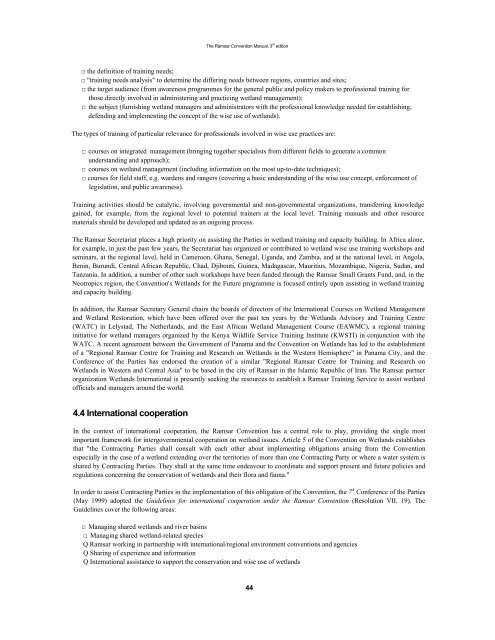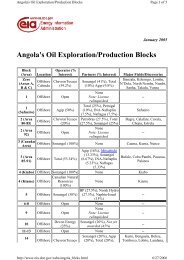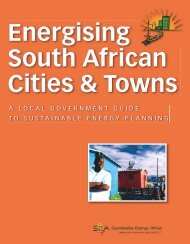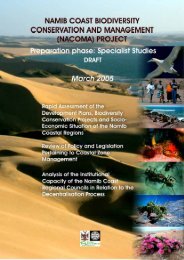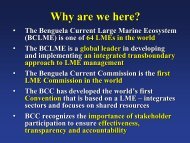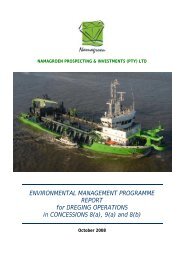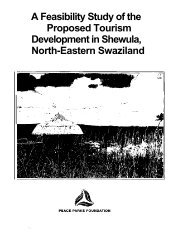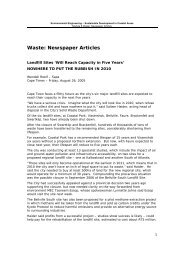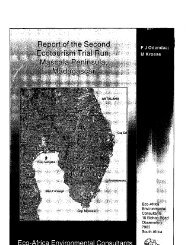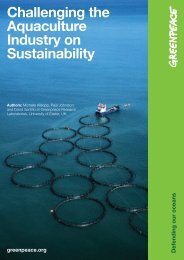The Ramsar Convention Manual.pdf
The Ramsar Convention Manual.pdf
The Ramsar Convention Manual.pdf
You also want an ePaper? Increase the reach of your titles
YUMPU automatically turns print PDFs into web optimized ePapers that Google loves.
<strong>The</strong> <strong>Ramsar</strong> <strong>Convention</strong> <strong>Manual</strong>, 3 rd edition<br />
□ the definition of training needs;<br />
□ "training needs analysis" to determine the differing needs between regions, countries and sites;<br />
□ the target audience (from awareness programmes for the general public and policy makers to professional training for<br />
those directly involved in administering and practicing wetland management);<br />
□ the subject (furnishing wetland managers and administrators with the professional knowledge needed for establishing,<br />
defending and implementing the concept of the wise use of wetlands).<br />
<strong>The</strong> types of training of particular relevance for professionals involved in wise use practices are:<br />
□ courses on integrated management (bringing together specialists from different fields to generate a common<br />
understanding and approach);<br />
□ courses on wetland management (including information on the most up-to-date techniques);<br />
□ courses for field staff, e.g. wardens and rangers (covering a basic understanding of the wise use concept, enforcement of<br />
legislation, and public awareness).<br />
Training activities should be catalytic, involving governmental and non-governmental organizations, transferring knowledge<br />
gained, for example, from the regional level to potential trainers at the local level. Training manuals and other resource<br />
materials should be developed and updated as an ongoing process.<br />
<strong>The</strong> <strong>Ramsar</strong> Secretariat places a high priority on assisting the Parties in wetland training and capacity building. In Africa alone,<br />
for example, in just the past few years, the Secretariat has organized or contributed to wetland wise use training workshops and<br />
seminars, at the regional level, held in Cameroon, Ghana, Senegal, Uganda, and Zambia, and at the national level, in Angola,<br />
Benin, Burundi, Central African Republic, Chad, Djibouti, Guinea, Madagascar, Mauritius, Mozambique, Nigeria, Sudan, and<br />
Tanzania. In addition, a number of other such workshops have been funded through the <strong>Ramsar</strong> Small Grants Fund, and, in the<br />
Neotropics region, the <strong>Convention</strong>'s Wetlands for the Future programme is focused entirely upon assisting in wetland training<br />
and capacity building.<br />
In addition, the <strong>Ramsar</strong> Secretary General chairs the boards of directors of the International Courses on Wetland Management<br />
and Wetland Restoration, which have been offered over the past ten years by the Wetlands Advisory and Training Centre<br />
(WATC) in Lelystad, <strong>The</strong> Netherlands, and the East African Wetland Management Course (EAWMC), a regional training<br />
initiative for wetland managers organized by the Kenya Wildlife Service Training Institute (KWSTI) in conjunction with the<br />
WATC. A recent agreement between the Government of Panama and the <strong>Convention</strong> on Wetlands has led to the establishment<br />
of a "Regional <strong>Ramsar</strong> Centre for Training and Research on Wetlands in the Western Hemisphere" in Panama City, and the<br />
Conference of the Parties has endorsed the creation of a similar "Regional <strong>Ramsar</strong> Centre for Training and Research on<br />
Wetlands in Western and Central Asia" to be based in the city of <strong>Ramsar</strong> in the Islamic Republic of Iran. <strong>The</strong> <strong>Ramsar</strong> partner<br />
organization Wetlands International is presently seeking the resources to establish a <strong>Ramsar</strong> Training Service to assist wetland<br />
officials and managers around the world.<br />
4.4 International cooperation<br />
In the context of international cooperation, the <strong>Ramsar</strong> <strong>Convention</strong> has a central role to play, providing the single most<br />
important framework for intergovernmental cooperation on wetland issues. Article 5 of the <strong>Convention</strong> on Wetlands establishes<br />
that "the Contracting Parties shall consult with each other about implementing obligations arising from the <strong>Convention</strong><br />
especially in the case of a wetland extending over the territories of more than one Contracting Party or where a water system is<br />
shared by Contracting Parties. <strong>The</strong>y shall at the same time endeavour to coordinate and support present and future policies and<br />
regulations concerning the conservation of wetlands and their flora and fauna."<br />
In order to assist Contracting Parties in the implementation of this obligation of the <strong>Convention</strong>, the 7 A Conference of the Parties<br />
(May 1999) adopted the Guidelines for international cooperation under the <strong>Ramsar</strong> <strong>Convention</strong> (Resolution VII. 19). <strong>The</strong><br />
Guidelines cover the following areas:<br />
□ Managing shared wetlands and river basins<br />
□ Managing shared wetland-related species<br />
Q <strong>Ramsar</strong> working in partnership with international/regional environment conventions and agencies<br />
Q Sharing of experience and information<br />
Q International assistance to support the conservation and wise use of wetlands<br />
44


